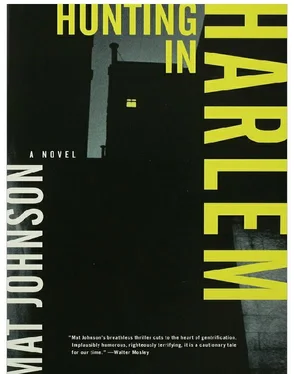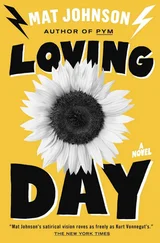A NIGHT OF designed levity, a bit of glamour to add to Harlem's luster, a moment to celebrate the unprecedented success of the last few months. Horizon Realty's black tie celebration was conducted along the entire 400 block of West 119th; the Fruit of Islam security force began clearing cars and sealing off the block after sunset. Dinner and dessert were to be held in the lodge's ballroom, but to highlight what the celebration was all about, Horizon-sold brownstones along the street were selected to host the preliminary courses.
Lester noted to the three that this location would have been impossible just two years before, but the comment was unnecessary. The location would have been impossible only eight months ago when they got there. The single-room-occupancy on the far corner from the lodge where the guy used to bring his TV out on the stoop attached to an extension cord — sold to a "happy face" buyer last April. The one across from that whose residents opted for stereo speakers and stained sheets in their windows instead of curtains now the home of a vice president at HBO whose parents uprooted from Mount Morris to Mount Vernon in 1958. Those three vacant shells? Sold in the boom of the last three months. The one whose contractor had yet to start made an impressive donation to the little Leaders Foundation in exchange for its art class painting images of polka-dot-curtained, flower-filled windows over the cinder-blocked ones.
The second Mrs. Bryant began serving hors d'oeuvres before the blockades were even erected, her home the perfect starting point, the incarnation of the brownstone dream. Bought in 1927 by the late Charles Bryant (1972) and refurbished by the first Mrs. Bryant soon after, enjoyed by her for nearly ten years before she was hit by an errant taxi somewhere in Murray Hill. "She had excellent tastes," said the second Mrs. Bryant, tray in hand, blooming under her guests' collective gaze.
Appetizers were up the steps of the Franklin townhouse. Joshua Franklin, two-year resident, his fiancée Regina Buder, resident for half that time. They had the food catered from three different Harlem restaurants: Bandana (Dominican), Bamboo (Creole), and of course M&G's Soul Food. The decor of the Franklin house could best be described as a mix between old brown wood and old brown cultures, the African carvings blending seamlessly in with the dark Victorian fixtures.
The residence of Daniel Harper and Gil Meehan was of much lighter bent, eggshell walls serving as perfect screens for the colorful mirages projected by outside lights through their many stained-glass windows. "All original," they assured their visitors. Mr. Harper was a set designer, Mr. Meehan a makeup artist. Everyone found Gil a treasure, appreciated that the white man seemed so at ease to be so outnumbered, appreciated the diversity he brought to the crowd.
Charlene and Bill Dougal were scheduled to offer coffee, tea, and cider in their living room, but the contractor had worked late and there was so much dust that they ran his industrial extension cord out to the front stoop and served from there. Originally excited about the idea, Charlene had called Lester Baines just that morning to try to back out, fearing that in comparison to the others, their brownstone, which had only just begun its transformation back to a single-family-home from a single-room-occupancy, would serve as a cautionary tale as well as an embarrassment. By nine P.M., when all participants were called to the serving of the main course in the lodge by Ghanaian talking drums, Charlene was relieved Lester'd never returned her call. The Dougals' home, its shredded floors, its barren caulk-filled walls had indeed seemed stark in comparison, but the emotion it prompted in the visitors was awe, and not simply for how little they'd paid for it. Strangers openly marveled at her strength in the face of such a momentous undertaking, the undertaking itself and goal at the end of it. The crowd grew in what would one day be the Dougals' dining room, forsaking the more comfortable alternatives to listen to the woman as she stood in front of the tent covered in plaster dust and nailed to the floor between the wood beams that the Dougals' were at this stage sleeping in. Engrossed in the tales of the trials she'd already encountered, the guests eased her fears with their own projections of how beautiful it would be when completed. They listened and believed for a moment that they too could be pioneers up here.
Having one's waitstaff dressed in Harlem Renaissance period clothes was so overdone, it was decided to have them dress up in traditional African garb instead. Ibos served entrees, Ashanti warriors handed out bottles of Star Beer while struggling to keep their kente wraps on with their left hands. Masai stood on one foot, aperitif trays attached to the ends of their staffs. Roles were assigned based on ethnic resemblance. Handing out the costumes, Horus joked that Bobby, by that logic, should be forced to "hold one of them spear trays as well," which was funny the first time, but Horus just kept saying it.
Horus's date was not a stripper. Horus's date was not a stripper. If Horus's date was not a stripper, then why was he smiling like that, repeatedly pulling Snowden to the side to deny something she was never accused of? Why was she wearing shoes with glass heels the size of hot dogs? Why was she handing out his business card? What other possible explanation could there be?
Snowden was dateless. Piper was there but had come on an invitation to the staff of the New Holland Herald, and that relationship was dying down anyway. With Snowden extremely careful about what he said to her, they had run out of things to talk about, or rather, after two months of little more than polite banter, they had become embarrassed that they'd found no shared interest to elevate the dialogue. They'd found a few things to argue about, but since the relationship had yet to develop enough animosity to need an outlet for it, those topics felt pointless as well. mostly they had sex, and mostly to cover up the silences, and not even that often anymore.
Snowden had never had a relationship that lasted longer than five months. Once one was started, he'd begin immediately asking himself how it would end. When would be the last kiss? Would the relationship explode in a heated exchange over some perceived insult, or would it simply dissipate into nothingness, a phone call never returned or followed up? With Piper, even ignoring the inherent danger of her inquisitive nature, they were so ill matched. Snowden had begun hoping that their end would come quickly and quietly, but was willing to risk a violent confrontation if she took offense at him trying to meet a new, better-suited partner among the night's attendees.
Aside from the minor distraction of Piper, the evening marked the return of the upbeat Snowden (it had been so long). This mental state was due largely to the fact that in all this time no more accidents had even been mentioned by the senior men of Horizon. Snowden had begun to strongly suspect that after the success of the Times article the tactic was deemed no longer necessary. This seemed possible, logical even. Cut your losses — made perfect sense. Snowden adored this suspicion, took comfort in the idea that he could just do his best to take care of Jifar and forget the rest.
The lodge was crowded with the beautiful women of New York City, glowing princesses emigrated from smaller towns and uglier cities, drained of aloofness by the humbling proximity of so many others. Bobby Finley, two cocktails in hand as he circled the room, trying once again to identify his romantic counterpart, his one, past failures far behind him. If she was here, Bobby would go to her and raise the extra glass to ask, "Martini?" and that simply his destined love affair would begin. The Great Work laid as bait back at an apartment somewhat cleaned for the occasion.
Читать дальше












